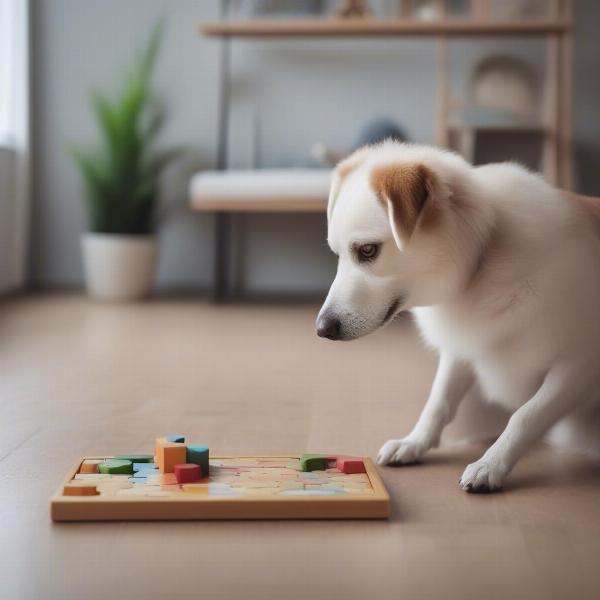Dog puzzle games are more than just fun distractions; they’re valuable tools for enriching your dog’s life. These interactive toys challenge your dog mentally, staving off boredom and promoting cognitive function. Whether you have a playful puppy or a senior dog looking for gentle stimulation, puzzle games offer a fantastic way to keep them engaged and entertained. From simple treat-dispensing toys to complex multi-stage puzzles, the right game can transform your dog’s downtime into an enriching experience.
Choosing the Right Puzzle Game for Your Dog
Selecting the perfect puzzle game depends on your dog’s breed, age, and personality. A highly energetic Border Collie will thrive with a more challenging game than a laid-back senior Cavalier King Charles Spaniel. Consider your dog’s chewing habits as well. For aggressive chewers, opt for durable, robust toys made from tough materials.
For puppies, simple treat-dispensing balls or puzzles with hidden compartments are a great starting point. These introduce the concept of problem-solving and reward. As your puppy grows, gradually increase the complexity of the puzzles.
Matching Puzzle Games to Your Dog’s Breed
Certain breeds are naturally predisposed to problem-solving and enjoy the mental stimulation of puzzle games. Breeds like German Shepherds, Poodles, and Golden Retrievers often excel at these challenges. However, even breeds not typically known for their puzzle-solving prowess can benefit from these enriching toys.
The Benefits of Dog Puzzle Games
Why are dog puzzle games so beneficial? They offer a wealth of advantages beyond simple entertainment:
- Mental Stimulation: Puzzle games challenge dogs to think critically, which keeps their minds sharp and helps prevent cognitive decline in older dogs.
- Boredom Buster: A bored dog can quickly become a destructive dog. Puzzle games provide a healthy outlet for excess energy and help alleviate boredom.
- Slow Feeding: For dogs who gobble their food down too quickly, puzzle feeders can slow their eating pace, promoting better digestion.
- Bonding Opportunity: Engaging in puzzle play with your dog strengthens your bond and builds a positive association with problem-solving.
Addressing Common Concerns: Is My Dog Too Old or Young for Puzzle Games?
The answer is almost always no! Puzzle games can be adapted to suit dogs of all ages and abilities. For senior dogs, choose puzzles that are easier to manipulate and offer softer treats.
Introducing Your Dog to Puzzle Games
Start with a simple puzzle and show your dog how it works. Use high-value treats to motivate them and offer plenty of encouragement. Don’t get discouraged if your dog doesn’t immediately understand the concept. Patience and positive reinforcement are key.
 Introducing Dog to a Puzzle Game
Introducing Dog to a Puzzle Game
Conclusion
Dog puzzle games are an invaluable tool for enriching your dog’s life, offering mental stimulation, combating boredom, and promoting a stronger bond between you and your furry friend. With a little patience and the right puzzle, you can unlock your dog’s inner genius and provide them with hours of engaging entertainment. Remember to choose a puzzle that suits your dog’s age, breed, and personality for the best results. Start simple and gradually increase the challenge as your dog becomes a puzzle-solving pro!
FAQ
- What are the best treats to use in dog puzzle games? Small, soft, and highly palatable treats work best. Consider using your dog’s favorite training treats.
- My dog isn’t interested in puzzle games. What should I do? Try different types of puzzles and treats. Start with easier puzzles and gradually increase the difficulty. Make it a positive experience with lots of praise and encouragement.
- Are puzzle games safe for puppies? Yes, but choose puzzles designed for puppies and supervise them during playtime.
- How often should I give my dog a puzzle game? You can offer puzzle games daily or several times a week.
- Can puzzle games help with separation anxiety? They can provide a distraction and help reduce anxiety, but they should be part of a comprehensive training plan for separation anxiety.
- Are homemade puzzle games an option? Absolutely! You can create simple puzzles using household items like cardboard boxes and toilet paper rolls.
- Where can I buy dog puzzle games? Pet stores, online retailers, and even some veterinary clinics sell a variety of dog puzzle games.
ILM Dog is your one-stop resource for all things dog-related. We offer expert advice on dog breeds, health, training, nutrition, grooming, and much more. From choosing the right breed to finding the perfect puzzle game, ILM Dog is here to help you navigate every aspect of dog ownership. Contact us today for personalized advice and support: Email: [email protected], Phone: +44 20-3965-8624.